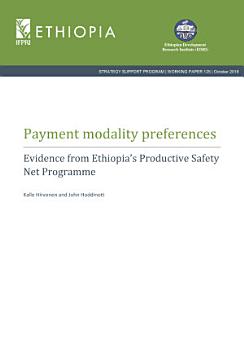Payment modality preferences: Evidence from Ethiopia’s Productive Safety Net Programme
Hirvonen, Kalle · Hoddinott, John F.
2018年10月 · ESSP Working Paper 第 125 本图书 · Intl Food Policy Res Inst
5.0star
1 条评价report
电子书
25
页
family_home
符合条件
info
report评分和评价未经验证 了解详情
关于此电子书
Economists typically default to the assumption that cash is always preferable to an in-kind transfer. We extend the classic Southworth (1945) framework to predict under what conditions this assumption holds. We take the model to longitudinal household data from Ethiopia where a large-scale social safety net intervention – the Productive Safety Net Programme (PSNP) – operates. Even though most PSNP payments are paid in cash, and even though the (temporal) transaction costs associated with food payments are higher than payments received as cash, the overwhelming majority of the beneficiary households prefer their payments only or partly in food. However, these preferences are neither homogeneous nor stable. Higher food prices induce shifts in preferences towards in-kind transfers, but more food secure households and those closer to food markets and to financial services prefer cash. There is suggestive evidence that preferences for food are also driven by self-control concerns.
评分和评价
5.0
1 条评价
为此电子书评分
欢迎向我们提供反馈意见。
如何阅读
智能手机和平板电脑
笔记本电脑和台式机
您可以使用计算机的网络浏览器聆听您在 Google Play 购买的有声读物。
电子阅读器和其他设备
如果要在 Kobo 电子阅读器等电子墨水屏设备上阅读,您需要下载一个文件,并将其传输到相应设备上。若要将文件传输到受支持的电子阅读器上,请按帮助中心内的详细说明操作。










